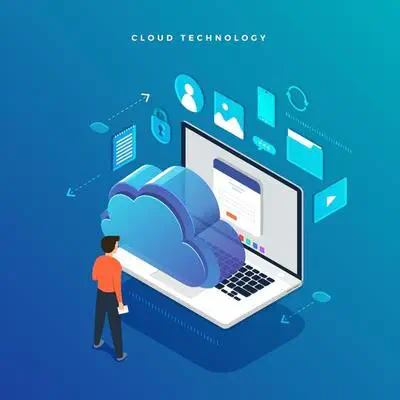Cloud Computing NPTEL
Mastering Cloud Computing with NPTEL - A Strategic Study Guide and Exam Recap.
 Cloud Computing
Cloud ComputingWhat is it?
Cloud computing refers to the delivery of computing services over the internet (“the cloud”) to offer faster innovation, flexible resources, and economies of scale. Instead of owning physical hardware or managing on-site servers, cloud computing allows individuals and organizations to access computing resources like servers, storage, databases, networking, software, and more, on-demand from cloud service providers.
Imagine cloud computing like renting a house instead of owning one. When you rent, you get to use the house without worrying about fixing things or paying for repairs. Similarly, cloud computing lets you use computer stuff like storage, software, and processing power without needing to own or manage the physical equipment.
What is this Blog for?
This blog presents all the materials and resources I used while studying for NPTEL SWAYAM MOOC -Cloud Computing.
In these notes, I meticulously reviewed each of the previous assignment questions, refining them one by one. I ensured that the relevant information was updated and the context of the questions was adjusted as needed. This approach allows me to have a comprehensive understanding of the topics covered and prepares me to tackle new, unseen questions that may arise.
Note: My examination date was 20th April, 2024. Thus, rest assured that each and every assignment until this date has been covered by me in these notes. For future, I would recommend you to use these notes along side the assignments that will be given in future.
Here is the link for the PDFs of notes that I made for preparing for the examination.
https://github.com/iiierie/NPTEL-MOOC/tree/main/cloud-computing
Course Layout
Week 1: Introduction to Cloud Computing
Week 2: Cloud Computing Architecture
Week 3: Service Management in Cloud Computing
Week 4: Data Management in Cloud Computing
Week 5: Resource Management in Cloud
Week 6: Cloud Security
Week 7: Open Source and Commercial Clouds, Cloud Simulator
Week 8: Research trend in Cloud Computing, Fog Computing
Week 9: VM Resource Allocation, Management and Monitoring
Week 10: Cloud-Fog-Edge enabled Analytics
Week 11: Serverless Computing and FaaS Model
Week 12: Case Studies and Recent Advancements
Personal Suggestions and Advice:
So, this was my second MOOC NPTEL course after “The Joy of Computing.” I heard this one was supposed to be easy to score without much studying, so I signed up. But when it was time to study for the exam, I realized it wasn’t going to be a walk in the park. The ppt of each week was over 150 slides, and so it was quite overwhelming. I ended up starting my study session just four days before the exam. At first, I tried to go through every single thing on those slides in the first two days. But then I realized the lecturer had packed the slides and course content with every possible bit of info existing, useful or not, trivial to important. It felt like there could be endless MCQs made just from just one slide. Even if I studied them all, I still felt lost when faced with a new question. And even if I studied them all carefully, in the end, if I saw a new question, all I could do was use up my existing knowledge or just randomly guess.
So, I changed my strategy. I focused on studying old assignments from past years and our own assignments. I figured if I understood those concepts well, I’d be better prepared. These notes have all those assignments and related concepts, so I’m ready for whatever questions they throw at me – whether they’re directly from the assignments or not.
Actual Exam:
So, in the exam, a whopping 70% of the questions were straight from the assignments. And let me tell you, those were a breeze – I’d seen them all before, even the numericals were identical, down to the last detail. It was like déjà vu. Easy peasy.
As for the other 30%, they were new questions, unseen territory. But with a bit of common sense and relying on what I already knew, I managed to tackle them just fine. So, overall, the exam wasn’t too tough.
My advice? If you’ve got some spare time before the exam, definitely go over the important topics and get a feel for them. Because honestly, a lot of the questions I didn’t recognize were pretty basic stuff. Just having a general idea about the subject matter was often enough to crack them.
But really, the assignments are where it’s at. They cover pretty much everything you need to know. I’ve heard from others who took this course before me that even in past exams in years before, most of the questions came straight from the assignments. So, while going through all the lecture slides might seem like a good idea, focusing on those assignments will serve you well. Trust me, it’s a breeze – good luck! Recommended to take it.
Despite not having watched a single lecture video for this course, I dedicated myself to studying for four intense days leading up to the exam. Let me tell you, it was a grind. But I’m confident in the effort I put in. I’ll update you on my marks soon, but for now, I’m feeling pretty good about how I did.